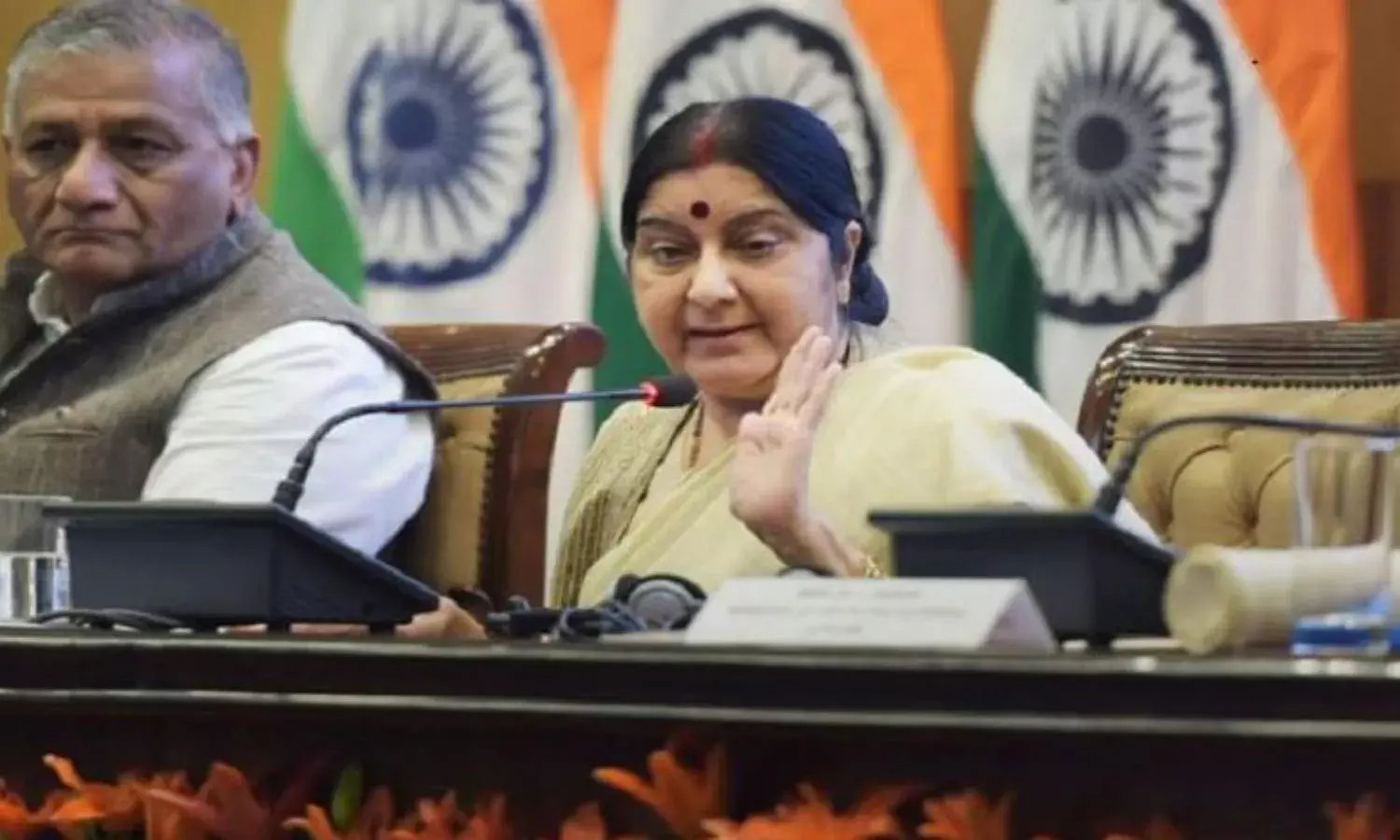Political Instinct Behind India Opting out of Talks with Pakistan?
Was BJP’s electoral calculation behind India’s opting out of talks with Pakistan?

It was the “political survival instinct” of the Bharatiya Janata Party (BJP) which made the BJP-led Indian government suddenly call off the Foreign Ministers-level India-Pakistan talks which were to be held on the sidelines of the UN General Assembly session in New York next week.
India’s Foreign Minister Sushma Swaraj and her Pakistani counterpart S.M.Qureshi were to meet and thrash out a range of issues bedeviling bilateral ties.
The reasons for not wanting talks with Pakistan were not what was cited on Friday by Raveesh Kumar, the spokesman of the Ministry of External Affairs.
Kumar had cited as the offending acts: the killing of three Indian security forces personnel and the release of a postage stamp glorifying the dead Hizbul Mujahideen militant Burhan Wani.
But the real reason for opting out was the political cost which the BJP would have to bear for talking with Pakistan eight months before the next parliamentary elections in a communally challenging environment in which rising Hindu nationalism, whipped up by Prime Minister Narendra Modi, has reached a peak in parts of the country where the BJP has electoral presence.
In this scenario, talks with trouble maker Pakistan could dent BJP’s image as a strong, nationalistic, anti-terrorist and anti-Pakistan and anti-Muslim party in contrast to the opposition Congress which is portrayed as a soft, pro-Muslim and pro-Pakistan party.
Moreover, to the BJP’s discomfiture, the opposition Congress, which is on the ascendant, had come down heavily on the Narendra Modi regime for not responding adequately to the killing of security forces personnel and the serial abduction of policemen in Kashmir.
Reason For Talks
The Modi regime’s initial warm response to Imran Khan’s overtures and the agreement to begin a dialogue at the Foreign Ministers’ level had been part of the BJP and RSS’ campaign to mend fences with the Muslims ahead of the May 2019 parliamentary elections.
Repeated reverses in provincial elections since 2014 had showed the BJP that it could not rely entirely on the Hindu vote. The support of the Hindus had been dwindling in the last four years because of the Modi regime’s comprehensive failure on the economic front.
To woo the Muslims to make up for erosion of Hindu support, Prime Minister Modi recently graced a major Bohra Muslim function at Indore in Central India. More recently, the RSS held a conclave in New Delhi in which Mohan Bhagwat, a top RSS leader, tried to convince the vast audience that “Hindutva” is not a communal ideology and that the RSS and the BJP are not anti-Muslim.
To win over the Nehruite secularist Hindus, Bhagwat said that the Congress had played a great role in the struggle against British rule and that it had also produced great leaders.
But all this was abandoned when it dawned on some influential elements at the top of the BJP or its government, that the bid to make up with the Muslims may not carry conviction with that community, and that a pro-Muslim stance might actually alienate the hard line Hindus who are the party’s core constituency.
That being so, it made no sense to go for talks with Pakistan at this juncture. The BJP regime abruptly abandoned the idea of talks. And to press home its point, the government expressed its dislike for Pakistan and its new leader Imran Khan in harsh terms, even discarding cultural and diplomatic niceties.
“Since yesterday’s announcement of a meeting between the Foreign Ministers of India and Pakistan in New York later this month, two deeply disturbing developments have taken place. The latest brutal killings of our security personnel by Pakistan-based entities and the recent release of a series of 20 postage stamps by Pakistan glorifying a terrorist and terrorism, confirm that Pakistan will not mend its ways,” Kumar said.
The incident showed the “true face” of Pakistan’s new Prime Minister Imran Khan, the spokesman added. It was also said that Imran had made anti-India speeches during his election campaign.
The excuses given for opting out of the talks are flimsy and unsustainable. Killing of security personnel in Kashmir is not an extraordinary event. And the postage stamp glorifying militant Burhan Wani was issued on July 24 before the Pakistani elections. Imran could not be blamed for something which was done by the previous government. As for Imran’s anti-Indian speeches at election time, it cannot be deemed a serious matter as all Pakistani politicians make anti-India speeches from election platforms.
The personal attack on Imran leads to the suspicion that New Delhi’s idea was to prevent an early resumption of talks with Pakistan. Imran and his massive following might take New Delhi’s remarks as a personal affront and would themselves refuse to enter into a dialogue with India in the foreseeable future.
India knows that Imran is skating on thin ice in Pakistan and that he would be hard put to it to resist pressures mounted by anti-India and Islamic extremist groups.
Only the other day, Imran had bowed to pressure from Islamic extremists who had wanted him to remove the renowned Princeton-based economist, Dr.Atif Mian, from membership of his Economic Advisory Council because Mian is an Ahmadiyya, a sect considered heretical by mainstream Muslims.
And in addition, there is always pressure from the army General Headquarters in Rawalpindi, which is never happy about efforts to arrive at a détente with India.
In this scenario, it is easy to accuse Imran of being anti-India personally, as indeed the Indian External Affairs Ministry spokesman did.
Be that as it may, India’s juvenile volte face has only secured derision from Pakistan. Its Information Minister, Chaudhry Fawad Hussain tweeted: “The Indian government is divided on the issue of negotiations. We have never seen such a puerile statement given by any Foreign Office. The world is watching: Pakistan stands for peace while Indian policies are being guided by extremist ideologies.”



